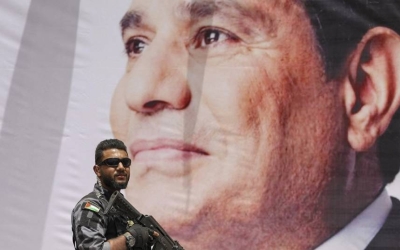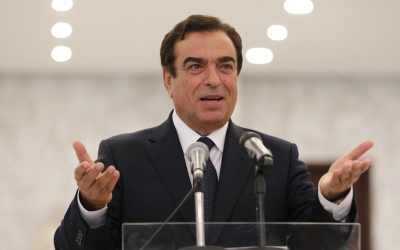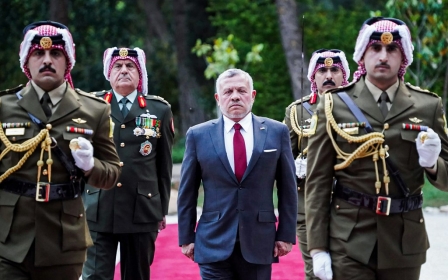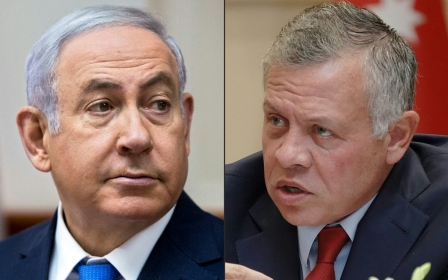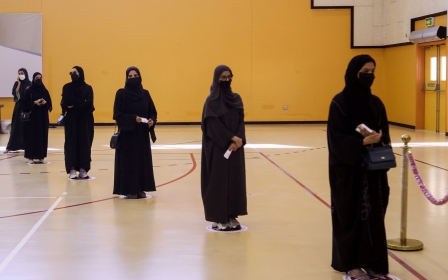Arabic press review: Egypt pushes for Sisi-Biden meeting at upcoming UK summit

Sisi keen to meet Biden at COP26
The administration of Abdel Fattah el-Sisi has been trying to arrange a meeting of “utmost importance” between the Egyptian president and his US counterpart Joe Biden at an upcoming summit in the UK, after unsuccessful attempts to secure Sisi an invitation to the White House, Al-Araby Al-Jadeed newspaper reported.
The UN Climate Change Conference, or COP26, is set to begin on Sunday in Glasgow, Scotland. The two-week-long event is expected to be attended by 20,000 people from almost every country in the world, including scientists, leaders and activists.
According to sources who spoke to Al-Araby Al-Jadeed, previous attempts had failed to facilitate a meeting between the two leaders in Washington DC due to pressures from think tanks and rights groups who criticised Egypt’s human rights records.
However there are “positive indications” after influential officials close to Sisi again made contacts with the US administration regarding the meeting, the London-based newspaper reported.
“The Egyptian leadership attaches the upmost importance to scheduling a meeting between the two presidents during the summit… especially in light of the moves that have been highly applauded by the US administration at the level of the Palestinian cause,” the sources said, referring to the September peace talks held in Cairo between Sisi, King Abdullah II of Jordan, and Palestinian Authority President Mahmoud Abbas.
"Officials in Egypt received positive indications on a possible brief meeting between the two presidents, after it was confirmed that the Egyptian president had travelled to Scotland to attend the summit.”
Biden, who took office on 20 January, made first contact with Sisi via a phone call on 20 May at the height of Israel’s attacks on Gaza to discuss efforts to achieve a ceasefire and bring an end to the conflicts.
The US leader thanked Sisi for “playing a critical role in this diplomacy,” a White House statement said at the time.
Sisi’s circle has been trying to contain negative publicity ahead of the summit in Glasgow, according to an Egyptian diplomatic source who spoke to Al-Araby Al-Jadeed.
On Thursday a group of Egyptian political exiles wrote to UK Prime Minister Boris Johnson asking him to withdraw an invitation to Sisi to participate in COP26.
Almost 40 Egyptians who sought political asylum in the UK signed the open letter expressing their concern upon hearing that the British government had invited Sisi to attend the global summit.
The letter noted that under Sisi, protests had been brutally suppressed and the media is reportedly controlled by the military, while numerous journalists had been arrested.
Egyptian security agencies had held a firm grip over political activism and dissent since Sisi staged a military coup in 2013, removing the government of Mohamed Morsi, the first democratically elected civilian president in Egypt's history.
Jordanians want end to Israel peace agreement
Jordanian activists and politicians have called for the annulment of the country’s peace treaty with Israel, 27 years after its signing, Arabi21 reported.
Activists want an end to the agreement, which they claim has “neglected Jordan’s water rights” and led to the water crisis currently experienced in Jordan, the report said.
Under the 1994 Wadi Araba peace agreement, Israel was committed to providing Jordan with water. Israel pumps water out of the Jordan river and transfers it back to Jordan during dry spells, as it remains one of the world's most water-scarce states.
But in April, then-Israeli Prime Minister Benjamin Netanyahu delayed approval despite recommendations by former energy minister, Yuval Steinitz, and water authority officials to comply.
US President Joe Biden had to step in to pressure Israel into agreeing to increase water supply to Jordan, local media reported at the time.
Activists are also demanding Jordan’s political leadership stop all forms of normalisation with Israel, and to allow popular participation in the decision-making process concerning the country’s relationship with Israel.
The Islamic Action Front (AF), the largest political party in Jordan, has described the agreement as “ominous”.
"We demand the abolition of this agreement, which formed a disgrace and a dark page in the history of Jordan, ... and a betrayal of the blood of the martyrs of the Arab army and the martyrs of Jordan whose pure blood watered the land of Palestine in defence of it, Jordan and the holy sites,” the statement said.
'We demand the abolition of this agreement, which formed a disgrace and a dark page in the history of Jordan'
- statement on 1994 Wadi Araba peace agreement
"This painful memory comes as the Zionist enemy continues its crimes against the Palestinian people and stealing their lands and capabilities, the conspiracies of displacement and Judaization, the threat to Jordan as a state, regime and people, and the assault on Jordanian sovereignty and guardianship of holy sites, and efforts to divide the time and space of the Al-Aqsa Mosque.”
The Hashemite kingdom and Israel have been in a tit-for-tat row since March, when Israel's decision to cancel Jordanian Crown Prince Hussein bin Abdullah's visit to the Al-Aqsa Mosque in occupied East Jerusalem on 10 March led Amman to deny Netanyahu’s helicopter access to Jordanian airspace the very next day, as he was headed to the United Arab Emirates.
Under the 1994 agreement, Jordan was forced to formally relinquish claims to the West Bank and East Jerusalem. This was problematic, as Jordan’s Hashemites have drawn on religious lineage for legitimacy, including custodianship of Jerusalem’s Al-Aqsa Mosque.
However the treaty allowed Jordan to grow closer to a major US ally, which had two advantages: Jordan could push Israel for more US aid and act as a covert mediator between Israel and proximate states.
Emir of Qatar to amend citizenship laws
Qatar's emir has criticised the “tribalism tendency" in his country and pledged to make legislative amendments regarding citizenship, local media reported.
Sheikh Tamim bin Hamad Al Thani, in a speech at the opening session of the advisory Shura Council - for which partial polls were held for the first time earlier this month - said he instructed the cabinet to prepare legal amendments aimed at promoting "equal Qatari citizenship" and send them to the council for approval.
"Citizenship is not purely a legal issue, but is primarily civilizational and an issue of loyalty, belonging and duty, and not just rights," he said, adding that tribal intolerance was a "disease".
"Hateful intolerance, whether tribal or otherwise, could be manipulated and used to subvert and destroy national unity.”
The emir also urged Qataris to show "openness and tolerance" when Doha hosts the soccer World Cup next year.
Earlier this month Qatar held its first legislative elections for two-thirds of the Council, which in the past had been entirely appointed by the country’s ruler,
The council has legislative authority and approves general state policies and the budget, but has no control over executive bodies setting defence, security, economic, and investment policy for the small but wealthy gas producer, which has banned political parties.
However the legislative polls stirred debate about electoral inclusion and citizenship after some members of a leading tribe found themselves ineligible to vote under a law restricting voting rights to Qataris whose family was present before 1930.
Lebanese minister faces lawsuit over Yemen statements
Lebanon’s information minister is facing a lawsuit following his statements on the war in Yemen that sparked a diplomatic crisis between Beirut and Gulf states, Gulf website Al-Khaleej Online reported.
George Kordahi, the former host of the Arabic version of the show Who Wants to Be a Millionaire? who became information minister in September, appeared on the show Parliament of the People, broadcast by Al Jazeera, during which he was asked about his views on the war in Yemen.
Kordahi said Houthi rebels fighting the Saudi-led coalition were acting in self-defence and "weren't attacking anyone", before calling the conflict in Yemen “absurd".
Saudi Arabia and allies including the United Arab Emirates have led a military coalition fighting against Iran-allied Houthi rebels in the country since 2015.
"They are defending themselves against external attacks launched for years against Yemen," Kordahi told the news presenter.
In the same show, Kordahi went on to express his hopes for a military coup in Lebanon to "defend people's rights" - sparking condemnation from Lebanese social media users.
His televised appearance has angered Riyadh and other Gulf states, leaving Lebanese officials scrambling to smooth over the situation.
The lawsuit, brought by a group of lawyers in Lebanon, demanded an investigation into Kurdahi and all those involved in the latest crisis, as well as the arrest of Kurdahi, said Lebanese lawyer Tarek Chindeb, according to Al-Khaleej Online.
It also suggested that Kurdahi’s action might have been premeditated, as he was a well-established journalist and an experienced politician who, as information minister, currently represents the Lebanese media.
Middle East Eye propose une couverture et une analyse indépendantes et incomparables du Moyen-Orient, de l’Afrique du Nord et d’autres régions du monde. Pour en savoir plus sur la reprise de ce contenu et les frais qui s’appliquent, veuillez remplir ce formulaire [en anglais]. Pour en savoir plus sur MEE, cliquez ici [en anglais].


